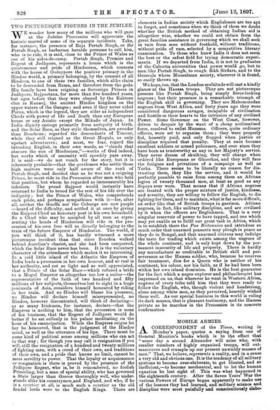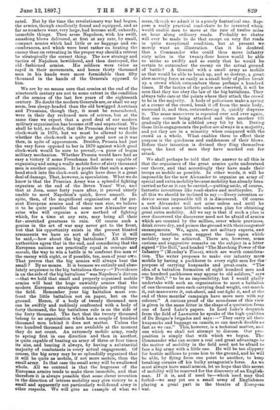MOBILE ARMIES.
ACORRESPONDENT of the Times, writing in Monday's paper, quotes a saying from one of General Maurice's books which is to the effect that "some day a second Alexander will arise who, with smaller numbers of highly organised troops, will out- manceuvre and crumple up our present unwieldy masses of men." That, we believe, represents a reality, and in a sense a very old and obvious one. It is the tendency of all military systems to become over-elaborate, to get bloated, and so inefficient,—to become mechanical, and to let the human equation be lost sight of. This was what happened in the eighteenth century. After the Seven Years' War the various Powers of Europe began apparently to make use of the lessons they had learned, and military science and discipline were most painfully and conscientiously elabo- rated. But by the time the revolutionary war had begun, the armies, though excellently found and equipped, and as far as numbers went. very large, had become stiff, unhandy, immobile things. Then arose Napoleon, with his swift, smashing blows delivered, at first at any rate, by small, compact armies which had little or no baggage and en- cumbrances, and which were bent rather on beating the enemy than on retreating in the proper way should a retreat be strategically the correct thing. The new strategy and tactics of Napoleon bewildered, and then destroyed, the old - fashioned armies. His soldiers were twice as rapid in their movements, and hence thirty thousand men in his bands were more formidable than fifty thousand in the hands of the Generals opposed to him.
We are by no means sure that armies at the end of the nineteenth century are not to some extent in the condition of the armies of the last few years of the eighteenth century. No doubt the modern Generals are, or shall we say seem, less sleepy-headed than the old bewigged Austrians and Prussians, though they, it must be remembered, were in their day reckoned men of science, but at the same time we expect that a good deal of our modern military organisation has become stiff and unpractical. We shall be told, no doubt, that the Prussian Army went like clock-work in 1870, but we must be allowed to doubt whether the clock-work is quite as good now as it was then, in spite of appearances. Besides, Prussia had just the very force opposed to her in 1870 against which good clock-work would be sure to prevail,—a. piece of bogus military mechanism. Whether Prussia would have had as easy a victory if some Frenchman had arisen capable of organising and using a really mobile force of sixty thousand men is another question. It is possible that such a spear- head stuck into the clock-work might have done it a great deal of damage. That, however, is speculation. What we do know is that the Prussian Army was a splendid fighting organism at the end of the Seven Years' War, and that at Jena, some forty years after, it proved utterly unable to meet Napoleon's quick, fierce assault. In spite, then, of the magnificent organisation of the pre- sent European armies and of their vast size, we believe it to be quite possible that some new Alexander may arise who will organise a new method of fighting which, for a time at any rate, may bring all their far - stretched greatness to ruin. Of course such a genius in the art of war may never get to the front, but that his opportunity exists in the present bloated armaments we have no sort of doubt. Yet it will be said,—how about the big battalions ? All military authorities agree that in the end, and considering that the European nations are practically equal in courage and morale, the way to win a battle is to confront five men of the enemy with eight, or if possible, ten, men of your owa. That proves that the big armies will always beat the small ? By no means. It is because we entirely and abso- lutely acquiesce in the big battalions theory—" Providence is on the side of the big battalions" was Napoleon's dictum —that we hold that small and properly organised mobile armies will beat the huge unwieldy armies that the modern European strategists contemplate putting into the field. Remember your big battalion must con- front the little battalion not on paper, but on the ground. Hence, if a body of twenty thousand men can be swiftly and suddenly confronted with a body of forty thousand, the big battalions rule is on the side of the forty thousand. The fact that the twenty thousand belong to an organisation which has a couple of hundred thousand men behind it does not matter. Unless the two hundred thousand men are available at the moment they do not count. An extremely mobile army, ready to spring first in one direction and then in another, is quite capable of beating an army of three or four times its size, and beating it always, by having a substantial majority of combatants in every actual engagement. Of course, the big army may be so splendidly organised that it will be quite as mobile, if not more mobile, than the small army. In that case the small army will be swallowed whole. All we contend is that the hugeness of the European armies tends to make them immobile, and that therefore it is always possible that some clever invention in the direction of intense mobility may give victory to a small and apparently not particularly well-found army in other respects. We will give an example of what we mean, thau2h we admit it is a purely fantastical one. Sup- pose a really practical road-skate to be invented which: would enable men to move at the rate of twelve miles an hour along ordinary roads. Probably no skates. will ever be made to do that except on very flat roads in quite exceptional condition, but at present we merely want an illustration. Can it be doubted. that a Commander who could thus move infantry sixty miles in the twenty-four hours would be able to strike so swiftly and so surely that he would be. certain to outnumber the enemy on the actual ground of battle ? A General with a small army as mobile as that would be able to break up, and so destroy, a great slow-moving force as easily as a small body of police break up a crowd which outnumbers them perhaps a hundred times. If the tactics of the police are observed, it will be seen that they too obey the law of the big battalions. They always take care at the points where they attack the crowd to be in the majority. A body of policemen make a spring at a corner of the crowd, break it off from the main body, surround it, and then, outnumbering it, quickly disperse. it. The same manceuvre is repeated over and over again,. first one corner being attacked and then another till gradually the mob is nibbled away bit by bit. During. these little engagements the police are always in a majority, and yet they are in a minority when compared with the crowd as a whole. What enables them to effect their purpose is the quickness and suddenness of their blows.. Before their intention is divined they fling themselves, upon the knot of men they have marked out for attack.
We shall perhaps be told that the answer to all this iv that the organisers of the great armies quite understand our theory, and that accordingly they have made their troops as mobile as possible. In other words, it will be impossible for the new Alexander to organise an army of special and extra mobility because mobility has already been • carried as far as it can be carried,—putting aside, of course, fantastic inventions like road-skates and multicycles. To- all this we should be inclined to say :—Every invention or- device seems impossible till it is discovered. Of course a new Alexander will not arise unless and until he can think out some hitherto unknown plan for obtaining great extra mobility. All we say is that if such a plan is ever discovered the discoverer need not be afraid of armies which are counted by the million, cover whole provinces, drink rivers dry, and poison the ground with theircongested' encampments. We, again, are not military experts, anct. cannot, therefore, even suggest the lines upon whicir mobility may be achieved. There are however, some curious and suggestive remarks on the subject in a letter signed "The Bull," and headed "The Marching Power of the Infantry" (Monday's Times), which are worth considera- tion. The writer proposes to make our infantry more mobile by having a packhorse to every eight men for tho'l purpose of carrying knapsacks and great-coats. " The- idea of a battalion formation of eight hundred men and one hundred packhorses may appear to old soldiers," says "The Bull," "to be an impossibility, but I would gladly undertake with such an organisation to meet a battalion of one thousand men each carrying dead weight, out-march- it, out-manceuvre it, out-shoot, and out-fight it, and at the end of three months' campaign have more men with my colours." A curious proof of the soundness of this view- is given in the same letter in the shape of a quotation fronr one of Lord Lake's papers. In Lord Lake's despatch from the field of Laswarrie he speaks of the high qualities of De Boigne's brigades and says :—" They carry all their knapsacks and baggage on camels, so can march double as fast as we can." This, however, is a technical matter, and one which we shall not attempt to discuss. Our pro- position is simply that with which we began. Thu, Commander who can secure a real and great advantage it: the matter of mobility in the field need not be afraid to face a big army with a little one. He will be too slippery for hostile millions to press him to the ground, and he wilt be able, by flying from one point to another, to keep breaking corners off his bulky antagonist's force. As we must always have small armies, let us hope that this secret of mobility will be reserved for the discovery of an English- man. If it is, and if need be—which need may God forbid—we may yet see a small army of Englishmen playing a great part in the theatre of European war.



































 Previous page
Previous page